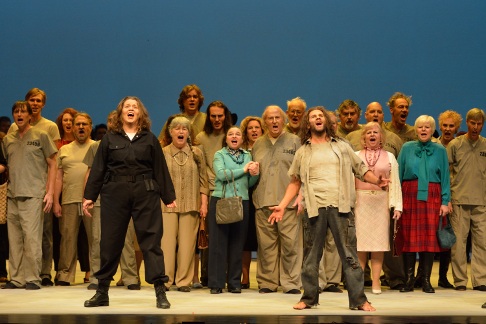26 Dec 2014
Fidelio, Manitoba Opera
For the first time in its 42-year history, Manitoba Opera presented Beethoven’s mighty ode to freedom, Fidelio, with an extraordinary production that resonated as loudly as tolling bells of freedom.

For the first time in its 42-year history, Manitoba Opera presented Beethoven’s mighty ode to freedom, Fidelio, with an extraordinary production that resonated as loudly as tolling bells of freedom.
And it is a mystery why it’s taken this long to see the German composer’s sole opera with its message of hope never more sorely needed than today. Kudos to MO’sGeneral Director/CEO Larry Desrochers, who also directed the 150-minute production (sung in German with English surtitles) for choosing this opera that also commemorates the historic opening of Winnipeg’s Canadian Museum for Human Rights — the first national museum built outside the country’s capital Ottawa.
Desrochers’ vision transplants French librettist Jean-Nicolas Bouilly’s original story to 1989 Cold War Germany, circa the time of the fall of the Berlin Wall which lent its own contemporary relevance.
Maestro Tyrone Paterson led the Winnipeg Symphony Orchestra throughout Beethoven’s uplifting score. Set/costume designer Sheldon Johnson’s towering pockmarked grey prison walls; industrial hanging lights and two carbon copy office desks further infused the opera’s visual world with stark, regimented order. Bill Williams’ razor sharp lighting design helped mitigate the production’s overly monochromatic feel - not helped by drab, prisonesque costumes — with effects such as shafts of cold light in Act II’s dungeon scene as penetrating as search lights.
Saskatchewan-born soprano Ileana Montalbetti in her company debut as protagonist Leonore proved well worth the wait. Her chameleonic ability to morph between manly Fidelio and devoted wife Leonore is as remarkable as her strong, effortless voice and dramatic skills. Her powerhouse ‘big moment’ aria“Abscheulicher, wo eilst du hin" in which she resolutely vows to save her husband easily deserved one of the first bravas of the night.
Canadian tenor David Pomeroy compelled in his role debut as shackled political prisoner Florestan, his dramatic voice first heard as a bellowing cry of human suffering during his Act II opening recitative/aria “Gott! welch' unkel hier! In des Lebens Frühlingstagen.” His keen acting skills perfectly balanced both worlds of struggle and strength; not inspiring pity but true compassion as he collapsed in chains until finally rescued by Leonore.
Critically acclaimed bass-baritone Kristopher Irmiter portrayed the villainous Don Pizarro with swaggering menace. His initial, less-is-more delivery finally exploded during aria “Ha! welch ein Augenblick!" in which he vows to murder his nemesis Florestan, likewise effectively pulling the puppet strings of American bass Valerian Ruminski in his role as jailer Rocco.
 Ileana Montalbetti as Fidelio and David Pomeroy as Florestan with the Manitoba Opera Chorus
Ileana Montalbetti as Fidelio and David Pomeroy as Florestan with the Manitoba Opera Chorus
Charismatic Winnipeg-born soprano Lara Secord-Haid also made an impressive MO debut as teenaged character Marzelline, blindly in love with Fidelio as she thwarted Irish-Canadian tenor Michael Colvin’s Jacquino’s romantic advances during duet “Jetzt, Schätzchen, jetzt sind wir allein.” The rising star’s crystal clear voice easily soared to the top of her range during " O wär ich schon mit dir vereint,” wholly convincing as a fickle young girl in love.Bass-baritone David Watson imbued his benevolent government official Don Fernando, who frees all prisoners including his longtime friend Florestan, with his customary gravitas.
Admittedly, the dynamic between the lead couple did not always ring true. Although Fidelio is ostensibly an opera of ideas, at its core it remains a deeply abiding love story. After Leonore finally saves her husband, she ecstatically sings of “indescribable joy” — albeit across the stage. After being separated for two years, wouldn’t she immediately rush into his arms? This emotional disconnect became the production’s only flaw.
Nevertheless, all was quickly forgiven during the climactic finale where the stage floods with scores of real-life heroes and heroines — former refugees now making their home in Winnipeg — who all carry within themselves their own true life Fidelio opera. Their dignified presence as the MO Chorus (prepared by Tadeusz Biernacki)sings, “God tests us but does not desert us” moved many in the opening night crowd to tears that became the crux of the entire production. There could be no more intensely raw, authentic moment on any stage, operatic or theatrical alike in our city all season long, with the powerful image not soon easily forgotten.
Holly Harris